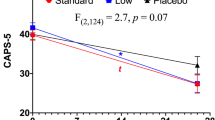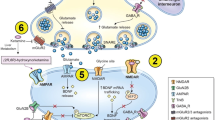Abstract
Rationale
Depressive episodes are the leading cause of mental health-related hospital admissions in Australia, and 44% of those admitted have a previous history of hospitalisations for depression (Admitted patient mental health-related care: (Australian Institute of Health and Welfare Aust Hospital Stat 2011–12, 2013). Despite numerous available antidepressant treatments, many patients do not respond to conventional therapy, having what is called ‘treatment resistance’ (Fava Biol Psychiatry 53:649–659, 2003). In recent years, ketamine has risen to prominence as an effective, rapidly acting antidepressant (Ketamine: a light in the darkness: Paleos and Ross 28–33, 2013). However, customary intravenous (IV) and intramuscular (IM) routes of administration and relapse rates after cessation remain barriers to more widely adopted usage.
Objectives
This study represents the largest retrospective review of patients receiving long-term oral ketamine for treatment-resistant depression and post-traumatic stress disorder (PTSD). Our purpose was to examine the safety and efficacy of oral ketamine therapy in an outpatient setting as measured by changes in hospitalisation for psychiatric episodes.
Methods
Hospital records of 37 patients who received oral ketamine treatment were reviewed to compare the number and duration of psychiatric hospital admissions before and after treatment. Records were also screened for adverse medical events and changes in ketamine dosage over time.
Results
Following treatment, inpatient hospital days were reduced by 70%, and hospital admissions were reduced by 65%. The dose of ketamine patients required was stable over time with no evidence of tolerance building. There were no serious adverse events and no long-term negative effects associated with ketamine.
Conclusions
Oral ketamine offers a promising pharmacologic adjunct to depression treatment. It may offer a more approachable alternative to IV or IM ketamine. The results warrant further investigation into the safety and efficacy of oral ketamine for psychiatric treatment.





Similar content being viewed by others
References
aan het Rot M, Collins KA, Murrough JW, Perez AM, Reich DL, Charney DS, Mathew SJ (2009) Safety and efficacy of repeated-dose intravenous ketamine for treatment-resistant depression. Biol Psychiatry 67(2):139–145. https://doi.org/10.1016/j.biopsych.2009.08.038
Australian Institute of Health and Welfare (2013) Admitted patient mental health-related care: Australian hospital statistics 2011–12, 5
Berman RM, Cappiello A, Anand A, Oren DA, Heninger GR, Charney DS, Krystal JH (2000) Antidepressant effects of ketamine in depressed patients. Biol Psychiatry 47(4):351–354. https://doi.org/10.1176/appi.ajp.2013.13030392
Borner M, Scheithauer W, Twelves C, Maroun J, Wilke H (2001) Answering patients’ needs: oral alternatives to intravenous therapy. Oncologist 6(4):12–16. https://doi.org/10.1634/theoncologist.6-suppl_4-12
Broughton PF, Waldron BA (1983) Ketamine hypertension and the renin-angiotensin system. Clin Exp Hypertens 5(6):875–883. https://doi.org/10.3109/10641968309081814
Canterbury District Health Board (2015) Complications of peripheral intravenous therapy. https://www.cdhb.health.nz/Hospitals-Services/Health-Professionals/CDHBPolicies/Fluid-Medication-Manual/Documents/Complications-Of-IV-Therapy.pdf. Accessed 21 Oct 2016
Chu PSK, Kowk SC, Lam KM, Chu TY, Chan SWH, Man CW, Ma WK et al (2007) ‘Street ketamine’–associated bladder dysfunction: a report of ten cases. Hong Kong Med J 13(4):311–313
Columbia University (n.d.) Module 01: advanced pain control and sedation. http://ccnmtl.columbia.edu/projects/aegd/mod01_mec_ivcomp.html. Accessed 21 Oct 2016
Fava M (2003) Diagnosis and definition of treatment-resistant depression. Biol Psychiatry 53(8):649–659. https://doi.org/10.1016/S0006-3223(03)00231-2
García-Larrosa A, Castillo C, Ventura M, Lorente JA, Bielsa O, Arango O (2012) Cystitis and ketamine associated bladder dysfunction. Actas Urológicas Españolas 36(1):60–64. https://doi.org/10.1016/j.acuro.2011.06.020
GraphPad Software. (n.d) GraphPad Prism version 7.0c for Mac. La Jolla, California.
Grégoire M-C, MacLellan DL, Finley GA (2008) A pediatric case of ketamine-associated cystitis (Letter-to-the-Editor RE: Shahani R, Streutker C, Dickson B, et al: ketamine-associated ulcerative cystitis: a new clinical entity. J. Urol. 69: 810–812, 2007). Urology 71(6):1232–1233. https://doi.org/10.1016/j.urology.2007.11.141
Hides L, Lubman DI, Devlin H, Cotton S, Aitken C, Gibbie T, Hellard M (2007) Reliability and validity of the Kessler 10 and Patient Health Questionnaire among injecting drug users. Aust N Z J Psychiatry 41(2):166–168. https://doi.org/10.1080/00048670601109949
Jansen KLR (2000) A review of the nonmedical use of ketamine: use, users and consequences. J Psychoactive Drugs 32(4):419–433. https://doi.org/10.1080/02791072.2000.10400244
Kurdi MS, Theerth KA, Deva RS (2014) Ketamine: current applications in anesthesia, pain, and critical care. Anesth: Essays and Res 8(3):283–290. https://doi.org/10.4103/0259-1162.143110
Liu G, Franssen E, Fitch MI, Warner E (1997) Patient preferences for oral versus intravenous palliative chemotherapy. J Clin Oncol 15(1):110–115. https://doi.org/10.1200/JCO.1997.15.1.110
Microsoft Corporation (n.d.) Microsoft Excel version 15.20 for Mac. Redmond, Washington
Murrough JW, Perez AM, Pillemer S, Stern J, Parides MK, aan het Rot M, Collins KA, Mathew SJ, Charnet DS, Iosifescu DV (2012) Rapid and longer-term antidepressant effects of repeated ketamine infusions in treatment-resistant major depression. Biol Psychiatry 74(4):250–256. https://doi.org/10.1016/j.biopsych.2012.06.022
Paleos CA, Ross S (2013) Ketamine: a light in the darkness. Multidisciplinary Association for Psychedelic Studies Bulletin, Special Edition, Spring: 28–33
Price RB, Nock MK, Charney DS, Mathew SJ (2009) Effects of intravenous ketamine on explicit and implicit measures of suicidality in treatment-resistant depression. Biol Psychiatry 66(5):522–526. https://doi.org/10.1016/j.biopsych.2009.04.029
Rasmussen KG, Lineberry TW, Galardy CW, Kung S, Lapid MI, Palmer BA, Ritter MJ et al (2013) Serial infusions of low-dose ketamine for major depression. J Psychopharmacol 27(5):444–450. https://doi.org/10.1177/0269881113478283
Schak KM, Vande Voort JL, Johnson EK, Kung S, Leung JG, Rasmussen KG, Palmer BA, Frye MA (2016) Potential risks of poorly monitored ketamine use in depression treatment. Am J Psychiatry 173(3):215–218. https://doi.org/10.1176/appi.ajp.2015.15081082
Schoevers RA, Chaves TV, Balukova SM, aan het Rot M, Kortekaas R (2016) Oral ketamine for the treatment of pain and treatment-resistant depression. Br J Psychiatry 208:108–113. https://doi.org/10.1192/bjp.bp.115.165498
Shahani R, Streutker C, Dickson B, Stewart RJ (2007) Adult urology ketamine-associated ulcerative cystitis: a new clinical entity. Urology 69(5):810–812. https://doi.org/10.1016/j.urology.2007.01.038
World Health Organization (2015) WHO model list of essential medicines. http://www.who.int/medicines/publications/essentialmedicines/EML_2015_FINAL_amended_NOV2015.pdf. Accessed 21 Oct 2016
Author information
Authors and Affiliations
Corresponding author
Ethics declarations
Conflict of interest
The authors declare that they have no conflict of interest.
Rights and permissions
About this article
Cite this article
Hartberg, J., Garrett-Walcott, S. & De Gioannis, A. Impact of oral ketamine augmentation on hospital admissions in treatment-resistant depression and PTSD: a retrospective study. Psychopharmacology 235, 393–398 (2018). https://doi.org/10.1007/s00213-017-4786-3
Received:
Accepted:
Published:
Issue Date:
DOI: https://doi.org/10.1007/s00213-017-4786-3




